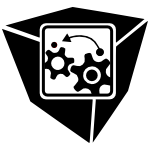AST
Abstract Syntax Tree
 AST
AST
 Q127380
Q127380

 Abstrakter Syntaxbaum
Abstrakter Syntaxbaum

 Abstract syntax tree
Abstract syntax tree

 Arbre syntaxique abstrait
Arbre syntaxique abstrait

 Абстрактное синтаксическое дерево
Абстрактное синтаксическое дерево
Abstract Syntax Tree
 AST
AST Q127380
Q127380
 Abstrakter Syntaxbaum
Abstrakter Syntaxbaum
 Abstract syntax tree
Abstract syntax tree
 Arbre syntaxique abstrait
Arbre syntaxique abstrait
 Абстрактное синтаксическое дерево
Абстрактное синтаксическое деревоTag #abstract syntax tree
24 papers:
 MSR-2019-PerezC #clone detection #detection #learning #syntax
MSR-2019-PerezC #clone detection #detection #learning #syntax- Cross-language clone detection by learning over abstract syntax trees (DP, SC), pp. 518–528.
 SANER-2019-BuchA #clone detection #detection #recursion #syntax
SANER-2019-BuchA #clone detection #detection #recursion #syntax- Learning-Based Recursive Aggregation of Abstract Syntax Trees for Code Clone Detection (LB, AA0), pp. 95–104.
 SANER-2019-YangW #difference
SANER-2019-YangW #difference- Pruning the AST with Hunks to Speed up Tree Differencing (CY, EJWJ), pp. 15–25.
- ICSE-2019-ZhangWZ0WL #novel #representation #source code #syntax
- A novel neural source code representation based on abstract syntax tree (JZ, XW, HZ0, HS0, KW, XL), pp. 783–794.
 ASE-2017-HigoOK #generative
ASE-2017-HigoOK #generative- Generating simpler AST edit scripts by considering copy-and-paste (YH, AO, SK), pp. 532–542.
 WICSA-2015-CoutoTCL #architecture #migration #syntax
WICSA-2015-CoutoTCL #architecture #migration #syntax- Migrating to an Extensible Architecture for Abstract Syntax Trees (LDC, PWVTJ, JWC, KL), pp. 145–154.
 OOPSLA-2014-ZhangLBF #optimisation
OOPSLA-2014-ZhangLBF #optimisation- Accelerating iterators in optimizing AST interpreters (WZ, PL, SB, MF), pp. 727–743.
 GPCE-2014-HumerWWWW #domain-specific language #self
GPCE-2014-HumerWWWW #domain-specific language #self- A domain-specific language for building self-optimizing AST interpreters (CH, CW, CW, AW, TW), pp. 123–132.
 ICSM-2013-MartinezDM #analysis #automation
ICSM-2013-MartinezDM #analysis #automation- Automatically Extracting Instances of Code Change Patterns with AST Analysis (MM, LD, MM), pp. 388–391.
 LDTA-J-2009-SoderbergEHM #analysis #syntax
LDTA-J-2009-SoderbergEHM #analysis #syntax- Extensible intraprocedural flow analysis at the abstract syntax tree level (ES, TE, GH, EM), pp. 1809–1827.
 GPCE-2013-0001RN #declarative #fine-grained #mining #source code
GPCE-2013-0001RN #declarative #fine-grained #mining #source code- Declarative visitors to ease fine-grained source code mining with full history on billions of AST nodes (RD, HR, TNN), pp. 23–32.
 LDTA-2012-Winther #precise
LDTA-2012-Winther #precise- Improving precision of generated ASTs (JW), p. 10.
 SAC-2009-DemailleLS #effectiveness #named #parsing #using
SAC-2009-DemailleLS #effectiveness #named #parsing #using- TWEAST: a simple and effective technique to implement concrete-syntax AST rewriting using partial parsing (AD, RL, BS), pp. 1924–1929.
 SOFTVIS-2008-Almeida-MartinezUV #named #syntax #visualisation
SOFTVIS-2008-Almeida-MartinezUV #named #syntax #visualisation- VAST: visualization of abstract syntax trees within language processors courses (FJAM, JUF, JÁVI), pp. 209–210.
 SLE-2008-OverbeyJ #generative #syntax
SLE-2008-OverbeyJ #generative #syntax- Generating Rewritable Abstract Syntax Trees (JLO, REJ), pp. 114–133.
 WRLA-2006-Reilles07 #canonical #syntax
WRLA-2006-Reilles07 #canonical #syntax- Canonical Abstract Syntax Trees (AR), pp. 165–179.
 MSR-2005-NeamtiuFH #comprehension #evolution #source code #syntax #using
MSR-2005-NeamtiuFH #comprehension #evolution #source code #syntax #using- Understanding source code evolution using abstract syntax tree matching (IN, JSF, MWH), pp. 81–85.
 DATE-2005-StergiouACRBM #design #library #network #pipes and filters #synthesis
DATE-2005-StergiouACRBM #design #library #network #pipes and filters #synthesis- ast pipes Lite: A Synthesis Oriented Design Library For Networks on Chips (SS, FA, SC, LR, DB, GDM), pp. 1188–1193.
 IWPC-2003-AntoniolPM #ocl #using
IWPC-2003-AntoniolPM #ocl #using- YAAB (Yet Another AST Browser): Using OCL to Navigate ASTs (GA, MDP, EM), pp. 13–22.
 SCAM-2003-AntoniolPMV #analysis #named #xml
SCAM-2003-AntoniolPMV #analysis #named #xml- XOgastan: XML-Oriented gcc AST Analysis and Transformations (GA, MDP, GM, UV), pp. 173–182.
 GPCE-2003-CalcagnoTHL #implementation #multi #using
GPCE-2003-CalcagnoTHL #implementation #multi #using- Implementing Multi-stage Languages Using ASTs, Gensym, and Reflection (CC, WT, LH, XL), pp. 57–76.
 SIGAda-1999-LortzT #ada #c++ #distributed #realtime
SIGAda-1999-LortzT #ada #c++ #distributed #realtime- The role of distributed, real-time Ada & C++ on the Airborne Surveillance Testbed (AST) program (HAL, TAT), pp. 181–182.
 ICSM-1998-BaxterYMSB #clone detection #detection #syntax #using
ICSM-1998-BaxterYMSB #clone detection #detection #syntax #using- Clone Detection Using Abstract Syntax Trees (IDB, AY, LMdM, MS, LB), pp. 368–377.
 ASE-1997-Welty #comprehension #syntax
ASE-1997-Welty #comprehension #syntax- Augmenting Abstract Syntax Trees for Program Understanding (CAW), pp. 126–133.











